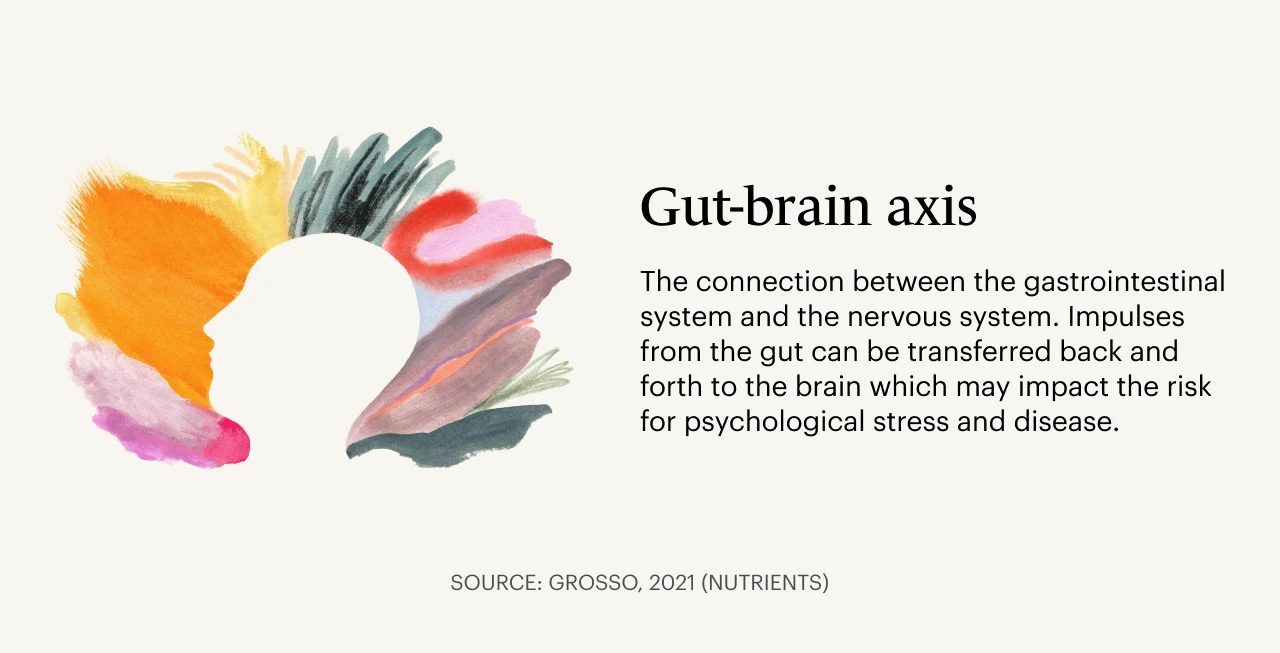What foods affect mood?
Can good nutrition improve mental health?
What are the best foods for the brain?
Foods affect mood, health, and emotions.
And eating certain foods can help or harm our mental health.
Food affects our mood, health, and emotions.
If you’ve ever been jittery and keyed up from too much sugar or caffeine, or if you’ve felt “hangry” or experienced increased anxiety because you’ve skipped a meal, you’ve felt firsthand how neglecting nutrition can leave you feeling lousy—with negative physical symptoms as well as detrimental emotional and mental impacts.
Drink too much alcohol at night? Expect a headache, nausea, and lack of focus the next day.
Overindulge in large plates of food at a large celebratory meal? You may experience bloating and acid reflux.
As a dietitian, when my clients eat the healthy foods I recommend, I’ve seen them experience lowered blood sugar and weight loss.
On the flip side, as a dietitian, when my clients eat the healthy foods I recommend, I’ve seen them experience lowered blood sugar and weight loss.
Eating healthy food can help prevent diseases like cancer and heart disease. And the right foods can also aid in weight control and blood sugar management.
Additionally, research shows that the relationship between our diets, mood, and behavior could have important implications for the treatment of mental health disorders, including anxiety and depression.

Can foods affect our mood and mental health?
In one word: yes.
In study after study, foods have been shown to impact our mental health.
It’s common and normal to crave sugary, fatty foods during times of stress and anxiety. Previous animal and human research indicates that energy-dense foods like chips, chocolate, and ice cream may offer some pain relief by tapping into our dopamine receptors.
Tasty food can also trigger feel-good memories that may bring some joy when we’re feeling down.
Can good nutrition improve mental health?
But, is there a diet for better mental health? Let’s look into what Americans are eating.
A 2017 meta-analysis indicates that a Western diet (high in fat and low in produce) is associated with greater depression risk.
The review of 21 studies in ten countries indicated that a diet containing more red and processed meat, refined grains, fried potatoes, and gravy and limited amounts of fruits, vegetables, whole grains, fish, and low-fat dairy products increased the risk of depression.
Brain health foods and nutrients needed to support cognition may be missing from the standard American diet. A Western-style diet has been associated with the risk of heart disease as well as diseases of the brain.

The connection between food and mood
A growing body of science-backed evidence suggests poor diet and bad choices in food may raise the risk of anxiety and depression.
The correlation is complicated as feelings of sadness or anxiety often lead to the consumption of comfort food like chips, candy, and fried foods.
Mental health issues can also be caused or exacerbated by the healthy foods and nutrients we may not be eating.
According to a 2020 review of biochemical and clinical evidence, the regulation of mood, energy, cognition, and focus depends on B vitamins such as B6, B12, and folate as well as tryptophan, phenylalanine, and several other amino acids.
Mental health issues can be caused or exacerbated by the healthy foods and nutrients we may not be eating.
These compounds contribute to the production of neurotransmitters including serotonin, dopamine, and norepinephrine. And these neurotransmitters influence our mood.
Omega-3-fatty acids found in fatty fish, walnuts, chia, and flaxseeds are also necessary for brain health. They help regulate the transmission of dopamine and serotonin to help decrease anxiety and depression.
A 2019 meta-analysis showed an overall beneficial effect of omega-3 polyunsaturated fatty acids on depression symptoms.
Gut health, inflammation, and mood
Researchers believe a phenomenon known as the gut-brain axis affects mood.
The gut-brain axis refers to the connection between the gastrointestinal system and the nervous system. Impulses from the gut can be transferred back and forth to the brain which may impact the risk for psychological stress and disease.
The foods we eat can foster bacteria that affect the intestinal microbiome-a collection of trillions of microorganisms that include bacteria, fungi, parasites, and viruses that reside in our gastrointestinal system.
Poor eating affects the gut microbiome by disrupting the gut barrier function, which may allow bacteria to get into circulation and lead to inflammation.
These microbes can be both beneficial and harmful to your health.
The microbiome drives the creation, metabolism, and transport of nutrients including B vitamins, amino acids, and vitamin K.
This system also protects the barrier of the gut from leakage of pathogens like viruses.
A poor eating pattern affects the gut microbiome by disrupting the gut barrier function, which may allow bacteria to get into circulation and lead to inflammation.
All this inflammation is thought to be behind alterations in brain chemicals that result in depression and other mental health issues.

What foods improve mood?
The good news is that we can improve our mood by eating better food.
Eating a Mediterranean diet, which includes lots of fruits, vegetables, lean protein sources, low-fat dairy products, and fish, has been found to reduce the risk of depression as well as dementia.
is there a diet for better mental health?
A recent randomized control trial of 152 adults with self-reported depression attended Mediterranean diet cooking classes for three months plus fish oil supplements for 6 months or participated in social groups for three months.
Evaluations were done at baseline, three, and six months and included mental health, quality of life, dietary questionnaires, and blood samples for fatty acid analysis.
At three months, the Mediterranean diet group had a higher intake of vegetables, fruit, nuts, beans, whole grains, and a variety of vegetables.
People following a Mediterranean diet experienced lower rates of cognitive decline, improved cognitive function, and lower risk of Alzheimer’s disease.
Lower intake of unhealthy snacks was also observed as well as red meat and chicken.
The Mediterranean diet had lower rates of depression and improved mental health scores.
A systematic review offers more evidence in recommending fruit and vegetables for better mental health.

The most significant results suggested that high total consumption of fruits and vegetables may promote increased levels of optimism and self-efficacy as well as lower levels of psychological distress and protection against symptoms of depression.
The general recommendation is to eat at minimum five servings of fruit and vegetables daily for mental health as part of your wellness and self-care routine.
Foods for brain health
As mentioned above, a Mediterranean diet may also protect against cognitive decline.
A systematic review of 12 studies, found that people adhering to a Mediterranean diet experienced lower rates of cognitive decline, improved cognitive function, and lower risk of Alzheimer’s disease.
The reduction in Alzheimer’s dementia was seen in 9 of the 12 studies.
The link between the metabolism of nutrients, the intestinal microbiome, internal metabolism, and cognitive decline is also promising.
A 2021 study from the University of Barcelona, found a diet rich in plant-based products reduces the risk of cognitive impairment in the elderly
The link between the metabolism of nutrients, the intestinal microbiome, internal metabolism, and cognitive decline is also promising.
This study showed a protective association between dietary components from cocoa, coffee, mushrooms, and red wine, apples, green tea, blueberries, oranges, and pomegranates, and cognitive losses in older people
Compounds in coffee and cocoa had protective effects while saccharin, from artificial sweeteners, had a damaging role. This research is important in developing preventive strategies against cognitive impairment.

The 10 best foods for mood mental health
Perhaps the best news of all is that the ten best foods for mental health are not difficult to include in your diet.
1. Coffee
That morning cup of coffee is doing more than helping to wake us up.
A 2020 study shows coffee may offer protection from dementia, due to the fact that it contains polyphenols, alkaloids, diterpenes and caffeic acid.
2. Green tea
A 2019 systematic review found that green tea drinkers showed reduced risk of cognitive impairment, dementia, and Alzheimer’s.
Green tea contains polyphenols, catechins, and other substances found to protect against dementia.
3. Blueberries
As part of the appropriately named MIND diet, blueberries are beneficial for reduction in depression risk as well as dementia.
Blueberries contain anthocyanins, an antioxidant shown to protect brain cells. They’re also a source of vitamin C and fiber.
4. Leafy greens, such as kale and spinach
Add more leafy greens like kale or spinach to your diet for better mental health.
Data from a systematic review of studies indicates that a high total intake of fruits and vegetables, including green leafy vegetables, may lower psychological stress, reduce depression, and foster well-being.
Greens contain potassium to lower blood pressure as well as folate for neurotransmitter production.
5. Salmon
Salmon and other foods such as walnuts and ground flaxseeds (see #6 on the list) containing omega-3-fatty acids protect our brain health.
Omega-3-fatty acids have anti-inflammatory properties, which have been found to reduce risk of depression and dementia.
6. Walnuts, and ground flaxseeds
Studies have shown-3-fatty acids that these foods containing omega-3s are helpful for our brain health.
7. Apples and oranges
Include apples and oranges in your diet for mental health.
Packed with phytochemicals and antioxidants, both fruits have been linked with better mental well-being, quality of life and improved sleep.
8. Beans
Beans may be beneficial for mental health. Fat-free but full of fiber, beans fuel your gut microbiome.
A study in pregnant women in Brazil indicated that low intake of beans was linked with higher rates of anxiety and depression.
9. Yogurt
Speaking of the gut microbiome, include yogurt in your diet for better mental health. Probiotics have been found to be beneficial in reducing depression.
Yogurt also provides B vitamins and amino acids to support brain function.
10. Dark chocolate
Finally, indulge in dark chocolate now and then. Dark chocolate is a source of flavonoids and magnesium.
A study found that adults who consumed dark chocolate reported lower rates of depression. (My mother taught me to always leave room for a little dessert.)

How to get mental health support
Food and a healthy diet can be transformative to our mental health and wellness as part of our daily self-care routines.
However, the guidance of licensed mental health professionals, such as therapists, can help support our mental health.
If you suspect you might be depressed, it’s important to reach out to a doctor or mental health professional, such as a therapist.
The Monarch Directory by SimplePractice can connect you with therapists who specialize in treating depression, as well as therapists near you who treat anxiety, and many other mental health specialties and concerns.

You can quickly and easily view their availability and book a therapy session. Many offer free 15-minute initial consultations and in-person or teletherapy video sessions.
If you have health insurance, you can find therapists who accept your insurance. Additionally, if you or your partner or spouse have an EAP (employee assistance program) through your work, you may find affordable or low-cost therapy.
READ NEXT: What Are the Types of Depression and the Levels?
Need to find a therapist? Check out the Monarch Directory by SimplePractice to find therapists near you with availability and online booking.






